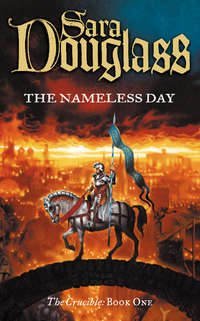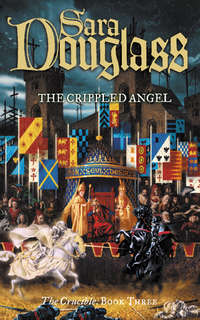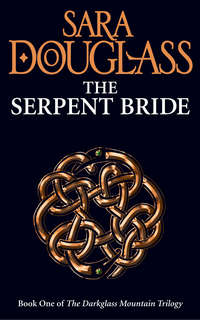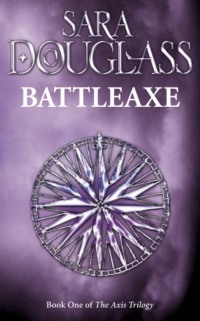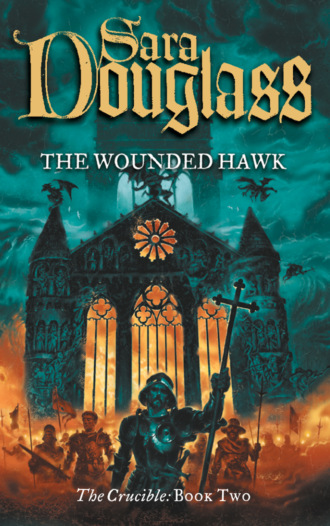
Полная версия
The Wounded Hawk
Bolingbroke tore himself free, the sword clattering to the ground, and whipped about to face Neville.
His eyes were furious. He began to say something, then he visibly fought for control, finally forcing the fury from his gaze.
Bolingbroke took a deep breath. “William,” he said, half turning to face the sergeant-at-arms, “I do apologise to you. I meant no harm.”
The man managed a half smile, but his hands were shaking as he sheathed his sword. “If you one day direct that anger at the French, my lord, then I do not mind being the near-murdered target of your practice.”
“Well, one day, please Jesus, maybe I will,” Bolingbroke said, and nodded a dismissal at the man.
“And that day may be closer than you think,” Neville said as William walked away.
“What? What news?”
“Hal, your father sent me to find you. Richard has called a council of the great lords currently in London. We have an hour.”
Bolingbroke stared at Neville, then muttered a curse and ran for the door.
The courtyard of the palace of Westminster was clogged with horses, men-at-arms, pages, horse-boys, valets, squires, and ill-tempered nobles shouting for their attendants.
What could Richard want?
Although the Lords of the Privy Council were to be present at Richard’s hastily-called meeting, this was not a gathering of the Privy Council itself, for many more lords were to attend.
Bolingbroke and Neville dismounted from their horses, throwing their reins to the men of their escort. As they shouldered their way through the throng they saw Simon Sudbury, Archbishop of Canterbury, disappearing through the palace entrance way and, directly behind him, Thomas Brantingham, Bishop of Exeter.
They vanished inside in a flurry of scarlet and blue cloaks.
“Sudbury and Brantingham?” Bolingbroke muttered. “What is happening. Ah, look, there is my father!”
John of Gaunt, Duke of Lancaster, had emerged from a side entrance and was now only a few paces from Bolingbroke and Neville.
“Father?” Bolingbroke said.
Lancaster’s face was grey—but grey with anger and frustration rather than illness. “Richard has decided to take personal control of government,” he said, and held up his hand for silence as Bolingbroke spluttered. “He is eighteen, and his grandfather had taken personal control at the same age. He has a right … and the Privy Council has nodded their collective age-addled heads.”
“But why?” Bolingbroke said.
Lancaster gave his son a bleak look. “Why not? Hal, Richard has the right to rule on his own. My regency would not last forever.”
“He is to keep you as a councillor, surely.”
Now Lancaster’s look was even bleaker. “Nay, Hal. Richard is determined to cast off the chains of past monarchs … and apparently I am the greatest weight of them all.”
Bolingbroke and Neville shared a look, but Lancaster interrupted before either could speak. “There is no good to be done idling about here with our questions. Come, let us hear what our king has to say.”
Richard was to meet with his lords in the Painted Chamber. When Bolingbroke and Neville entered, they both noted that the hall had been somewhat modified since they’d last seen it. Richard’s bed had gone from the dais at the top of the hall—he had apparently moved to one of the apartments adjoining the Painted Chamber, possibly the Queen’s apartments which were empty of a Queen—and the space was now occupied by several trestle tables cluttered with boxes, maps, small chests and several score documents. Neville instantly thought the scene bore a remarkable resemblance to Bolingbroke’s disordered office, which Neville still had to succeed in bringing under some degree of control.
Several large tables had been placed end to end in the centre of the hall to form one long table, chairs drawn up about it. To each side stood groups of nobles, murmuring between themselves, some sipping from cups of wine.
Some faces were apprehensive, others confident.
A loud laugh sounded, and Bolingbroke’s and Neville’s eyes jerked to a group of three men standing close to the dais.
Robert de Vere, Henry Percy the Earl of Northumberland, and his son Hotspur.
All three were huddled companionably close, and de Vere had his arm about Hotspur’s shoulders.
The laugh had come from both de Vere and Hotspur, and they were staring straight at Bolingbroke.
“This is a bad business,” said a voice, and Lancaster, Bolingbroke and Neville turned about.
Ralph Neville—Thomas’ uncle and Baron of Raby and Earl of Westmorland—had joined them, and now he nodded to the three men standing before the dais. “Those three have an uncommon bond today. Why, I wonder?”
“De Vere is married to Northumberland’s daughter, Philippa,” Neville said. “Perhaps …”
Raby’s eyes had not left the three men, who were returning his stare with more than a little insolence. “There is more,” he said. “I think those men have traded something of greater value than a little woman-flesh.”
Neville looked back to the group, wondering what their alliance could mean for his uncle. Raby and Northumberland were rivals for power in the north of England … and now that Richard was apparently freeing himself of Lancaster’s influence, and Raby was so closely allied to Lancaster’s house and star, it boded nothing but evil that Northumberland and Hotspur now stood so smoothly with Richard’s favourite.
Of course it boded nothing but evil! Richard was freeing himself from all influences who could stay his hand, and allying himself with all those who, for the sake of their ambitions, would condone any devilry he chose to mouth.
“Ah,” Lancaster said. “There’s Gloucester. Hal, Ralph, we should join him.”
They walked over to where Thomas of Woodstock, Duke of Gloucester, and Lancaster’s youngest brother, stood with several of his attendants. Gloucester greeted his brother, nephew and Raby warmly, and even nodded civilly enough to Neville, apparently forgetting that Neville had once spoken harsh words to him when Gloucester had blamed Margaret for his wife’s death in childbirth.
“The little imp has won himself some new friends,” Gloucester said, nodding over to the Percys and de Vere, all still watching Bolingbroke and Lancaster.
“De Vere?” Lancaster said. “Aye, that he has, and I believe that it bodes—”
“My lords!” cried an attendant by the side entrance. “I give you your king!”
And there was Richard, striding into the hall and smiling at the assembled lords. His lean body was clad in tight-fitting black—a colour he now apparently preferred to green—and he wore no jewels or insignia of office save for a small circlet of gold.
Richard has dressed appropriately for whatever grim tidings he bears, Neville thought.
As the lords bowed, Richard walked to the throne set at the head of the tables and sat down, indicating that the lords, too, should take their places.
Neville moved slightly back as Lancaster, his brother Raby and Bolingbroke all sat midway down the table—
They should have been close to the king’s right hand, Neville thought.
—while their noble attendants, Neville among them, stood two or three paces behind the backs of their chairs.
“My lords,” Richard said, slowly raising his head and staring about the table, “it has now been some months since my beloved grandfather and father died—”
Why not state the truth, demon? Neville thought. They were murdered. He stared at Richard with hard eyes, and for one heartbeat Richard’s own gaze flickered his way and met his stare.
“—and, as is right and fitting, there has been a period of mourning and stillness as we honour their passing.
“But now my father and grandfather’s age has passed, and a new and fresh king sits upon the throne of England. I have been content to stay my hand during these months of transition, but now I must lift it—”
There was a collective drawing of breaths in the hall. What did he mean? Who were to lose their heads, and who to have preferments added to their purses?
“—and break free from the governorship of tutors and regents,” Richard looked directly at Lancaster, “who thought to keep me restrained within the bounds of childhood.”
“Your grace,” Lancaster said in a tight voice, “there was never ‘restraint’ intended. You came too suddenly to the throne without the training and consulship that we thought would be yours during the years of your father’s reign. We—”
“I was nevertheless restrained,” Richard said. “Furthermore, in past weeks I have well noted that some men,” and still his eyes were on Lancaster and his immediate companions, “have thought to gain for themselves a public notoriety and fame that they could well use against me.”
Here it comes, Neville thought, the dagger in Bolingbroke’s back. Nay, the dagger in the back of all associated with Bolingbroke and his father.
Again Richard’s eyes flickered Neville’s way before casting themselves restlessly about the assembled lords.
“I have thought myself in some danger,” he said softly. “Moreover, I have thought England in some danger. Therefore, listen you to these my decisions.
“Lancaster, you are removed as regent. I wish you good health and long life, but I have thought to surround myself with counsellors I can the more easily trust.”
Now the sharp intakes of breath about the table were clearly audible. Some men may have silently applauded, for Lancaster’s fall in favour would surely see the rise of their own influence, but all wondered at Richard’s arrogance that he so easily cast aside, and so publicly humiliate, the most powerful man in England.
“As with regents, so with all the major officers of government,” Richard continued. “My Lord Archbishop of Canterbury,” he nodded at Sudbury, “shall be my new Chancellor, and my Lord Bishop of Exeter,” now he nodded at Brantingham, “shall hold the office of Treasurer.”
Sweet Jesu, Neville thought, the imp has such confidence that he surrounds himself with the great men of the Church. Then his eyes fell on both Sudbury and Brantingham. Or are they great men of the Church? Is it possible they be demons, too?
Almost as if in reply, Sudbury shot Lancaster an apologetic, almost embarrassed, look—the two had been close allies for years. Neville revised his suspicions of Sudbury; if nothing else the man had obviously not yet told Richard about the subversive John Ball within the dungeons of Canterbury prison. If he had, Lancaster would be in the Tower.
“And to replace Lancaster at my side, as dearest friend and most trusted confidant, I appoint Robert de Vere my Chamberlain and,” Richard paused, and looked about the table with amused eyes, “also gift to him the castles and lands of Oakham and Queenborough—”
The sound of murmuring could clearly be heard about the table.
“—as well the castle of Berkhamsted, and create him the Chief Justice of Chester and North Wales—”
The table fell silent as many of the lords stared at Richard with horror.
“—and create him, as token of my love and trust, Duke of Ireland.”
The table erupted. Duke of Ireland? Many men spoke harshly—others, thinking to ally themselves with the new favourite, spoke words of congratulation—but no one spoke more volubly than Gloucester.
He sprang to his feet and slammed his fist down on the table.
There was instant silence.
“Your grace,” Gloucester seethed, “this preferment is beyond reasoning! You have created a man—”
“Who can counter the ill will of my uncle Lancaster!” Now Richard also was on his feet, and all Neville could think of was that Gloucester had very probably signed his own death warrant here this day.
“Lancaster bears you no ill will!” Gloucester said. “None! Had he done so, do you think he would have allowed you to so easily gain the throne? Don’t you realise, you silly pasty-faced youth—”
“Gloucester!” Now Lancaster was on his feet, trying to get Gloucester back into his chair, preferably with his mouth shut.
“Do you not think that I haven’t seen what my uncle and his beloved son are doing?” Richard yelled. “Did you not hear the screams of the crowds for their beloved ‘fair Prince Hal’ yesterday?” Now Richard’s face was twisted with hatred. “I will not nurture rivals at my court!’”
He stopped, breathing deeply to regain control of himself.
The entire table was still and tense. Lancaster had finally managed to get Gloucester back into his chair, while Neville had moved forward very slightly towards Bolingbroke, who sat stunned and disbelieving, staring at Richard.
Who could have thought that the demon would move so quickly to consolidate his power?
“You are fortunate, my fair Prince Hal,” Richard said, “that I do not commit you to the Tower for your treasonous thoughts.”
“Your grace,” Bolingbroke said, and all listening marvelled at the calmness of his face and voice, “I nurture no treasonous thoughts, nor ambitions that do not include you as my king and lord. I pray you believe me.”
“Then you must endeavour to earn my trust, Bolingbroke, for I cannot think but that you secretly yearn for my title and honours, and plan to use both Lancaster’s and Hereford’s lands and riches to seize them.”
The hush about the table was now extraordinary both in its depth and in its anticipation.
“Sire,” Bolingbroke said in a very quiet voice, “I went down on bended knee before you last May Day and pledged you my homage and allegiance. What have I done since that you now think me a traitor?”
Richard held Bolingbroke’s stare a long moment before he answered. “I move only so that you may never become a traitor, Bolingbroke,” he said. “Thank the sweet lord that you still have both your lands and life.”
Bolingbroke leaned back in his chair and looked away. He was pale with fury, and a muscle twitched in one cheek.
And had Richard thought he could do it, Neville realised, then he would indeed have deprived Bolingbroke of both lands and life. But Lancaster and his faction are still too powerful, and Richard must bide his time like a hunchbacked spider lurking in the shadows behind his web. Thank sweet Jesu Richard does not know of John Ball, and that Wycliffe is now safely silenced within the walls of Lutterworth!
Richard tore his gaze away from Bolingbroke and spoke for a few minutes of some other, minor, administrative appointments. Then …
“I have received a request for aid,” he said, and rose from his chair and ascended the dais, searching for a parchment which he finally located. He made a great show of perusing it, then spoke again, raising his voice so that he could clearly be heard around the table.
“This request I am disposed to regard kindly, for it could well rebound in England’s favour. Count Pedro of Catalonia has requested my assistance in some small domestic dispute he has with his bastard half-brother, Henry.”
Here Richard shot Bolingbroke another smouldering look, as if to imply that all relatives named Henry were bound to act treasonably sooner or later.
“Henry has apparently seized control of Pedro’s lands and revenues. Pedro needs help to get them back. I, and my chief advisers,” Richard indicated de Vere, Northumberland, Hotspur, as also Sudbury and Brantingham, “have decided to send a force into Catalonia in order to—”
“Your grace, this is madness!” Now Raby was standing, and Neville had to suppress a small groan and a desire to tackle his uncle to the floor. Was everyone he needed to aid him in his quest for the casket about to alienate themselves completely from influence?
“Any action in Catalonia,” Raby said, “is bound to remove forces from the south of France, where we need them most—”
“Westmorland, you will sit down!” Richard snapped. “Your advice on this matter is not sought.”
“More to the point,” Lancaster said, “Catalonia is under the overlordship of the King of Aragon. He will not be amused to think that England is sending an armed force into what he considers his own—”
“And your advice is most certainly not sought!” Richard said. “Pedro has the potential to be a good ally if handled correctly—”
At that remark a number of men about the table had to avert their eyes and bite their lips to keep the smiles at bay.
“—and if handed aid when he requires it.” Richard paused. “My Lord of Northumberland’s son. Hotspur, will lead the Catalonian expedition.”
Neville’s gaze shot to Hotspur. No wonder be had been so free and friendly with de Vere! But Hotspur? To lead such an expedition? He was brave, true, but young for a campaign that was going to need the delicate skills of a diplomat as much as the sword skills of the warrior.
“Your grace, England can ill afford the cost of such a venture.” Now Sir Richard Sturry, a trusted councillor of the dead King Edward, rose to his feet. “Already we are in considerable debt from our continued war with France—”
“All solved with the Treaty of Westminster,” Richard said, and waved Sturry back into his seat. “We can … and we will… afford this mission. It is time I make my mark, not only on England, but on Europe.
“My lords.” Richard now looked about the hall, and managed a small smile. “I think I have concluded my business for this day.”
Many of the Lords rose slowly to their feet as a sound of murmuring filled the hall.
But Neville was unable to tear his eyes away from Richard.
The king was standing behind one of the trestle tables on the dais, his eyes on Neville, a sly grin on his face …
… and his left hand resting on a small, brass-bound casket atop the table!
“Sweet Jesu,” Bolingbroke whispered as he joined Neville. “There it is!”
PART TWO The Wounded Wife
Thus, dear sister, as I have said before that it behooves you to be obedient to him that shall be your husband, and that by good obedience a wise woman gains her husband’s love and at the end hath what she would of him.
The Goodman of Paris to his wife, 1392
I
Before Matins, the Feast of St Melorius
In the first year of the reign of Richard II
(1 a.m. Saturday 1st October 1379)
For the past two hours small boats had slipped silently through the waters of the Thames, sliding to a brief halt at the wharf of the Savoy and depositing their cloaked and hooded cargo before continuing into the night. The men who jumped from the boats and then ran as quietly as they could up the steps to the river gate muttered their names urgently to the man standing there, before taking his murmured directions to dart into an underground storage chamber.
In all, Neville greeted some sixteen men, among them some of the mightiest nobles in England. When the last man arrived, Neville walked with him down to the storage chamber dimly lit with flickering torches.
As Neville closed the door behind him, and sat down on a keg, a deep silence fell over the shadowy room.
This was sheer danger. More than dangerous, for all the men gathered in this room knew that their alliance was as fragile and ephemeral as a spider’s web.
The betrayal might as easily come from within as without.
John of Gaunt, Duke of Lancaster, stood by a stack of ale kegs, his brother Gloucester to one side, Bolingbroke to the other. Close to him sat Ralph Neville, Baron of Raby and Earl of Westmorland. These men trusted each other, but were desperately unsure of the others.
And yet had not the others sought them out?
Gathered about in the rest of the room were some of the greatest lords in England. Richard, Earl of Arundel and Surrey and, Lancaster and his brethren had thought, one of Richard’s most trusted Privy Councillors. What was he doing here?
Less surprising was the presence of Thomas Mowbray, Earl of Nottingham and Duke of Norfolk. He had once been a close friend of Richard’s—they were of an age, and had grown up together. But now Nottingham had been rejected in favour of de Vere, and Nottingham’s resentment was widely known among the flower of England’s knighthood.
Thomas Beauchamp, Earl of Warwick, was no surprise at all: he had never been close to Richard, and, as with Sir Richard Sturry who sat close by him, had been publicly vocal in expressing some reservations regarding Richard’s actions. Both these men had spoken brief words of support to Lancaster and Bolingbroke as they’d stalked from the Painted Chamber yesterday afternoon.
There were others, too, earls and dukes, as well as ordinary knights, men who were profoundly disturbed by Richard’s actions of the past day, just as they had been disturbed by de Vere’s rapid rise to favour in the past few months.
“My lord,” Sturry broke the silence, and rose and gave Lancaster a slight bow as he spoke. “You are in mortal danger. You should—”
Lancaster halted him with a wave of his hand. “Richard would not dare to physically move against me.”
“My lord, your very power is enough to make him move,” Sturry said. “Perhaps not this week, or even this year, but once Richard feels he has consolidated his hold …”
Another brief silence, then Neville spoke. “My lords, I agree with Sir Richard that my Lord of Lancaster must beware of Richard’s ire, but I think my Lord of Gloucester in the more immediate danger. As,” he paused very briefly, “my Lord of Bolingbroke.”
There was a murmur of agreement about the room, and heads nodded.
“It would be better if both my brother Gloucester and my son Bolingbroke removed themselves from Richard’s immediate vicinity,” Lancaster said. “Perhaps my entire family should, for a time. Christmastide is approaching, and it will be easy to remove myself and mine to Kenilworth, citing the holy celebrations as cause enough.”
“And while we are all busy saving ourselves,” Mowbray said, “what do we do about de Vere? Well? Richard has made this man powerful beyond belief! Who knows what else he will give him in the next few months. My lords,” Mowbray leaned forward, his hands on his knees, his angry eyes scanning the room, “I have heard rumour the ‘Duke’ of Ireland will not be enough for Richard’s toy. Our king plans to invade Ireland and create de Vere King of Ireland!”
“He wouldn’t dare!” Gloucester said.
“Nay?” Mowbray said softly. “And who among us thought two days ago that de Vere would be greeting Saint Melorius’ Day as Duke of Ireland? Not to mention his other preferments.”
“Richard will move against Lancaster and all his allies,” Neville said. “He must if he wants to establish his own power as king. To do that he needs to build a coterie of powerful men who owe him their livings. De Vere is the first, but we all know there are many other men who will be willing to turn against Lancaster.”
Again, silence, as men nodded their heads. Lancaster was the most powerful man in England, and he had long been resented. Now that the new king had so publicly turned against him, those men who had long nurtured their jealousy would flock to Richard’s cause.
“It may have helped, ‘fair Prince Hal’,” Arundel said to Bolingbroke, “if you had not so successfully whipped up the London mob’s adulation on your wedding day. Lancaster is threat enough to Richard, but you are worse. You stand to inherit all your father’s power … and the common’s adoration as well. You are a threat beyond imagining.”
“My Lord Arundel,” said Bolingbroke, stepping forward so that his face was lit by a nearby torch. “I confess myself surprised to see you here, and to hear you speak such words of concern for me. You are one of Richard’s most trusted councillors. Why have you allowed yourself to stand closeted so deep with some of Richard’s worst enemies?”
Arundel nodded, acknowledging Bolingbroke’s distrust. “Richard is driving England into the ground. His expedition to Catalonia will be more ruinous than you know. Richard has no intentions of confining the expedition’s field of action to Catalonia—he intends to launch a new drive into the heart of France.”


